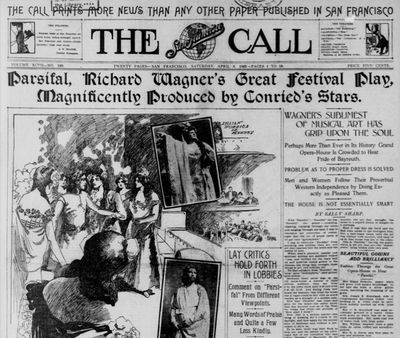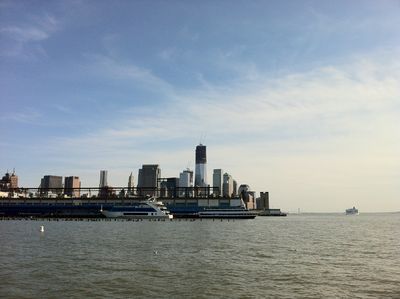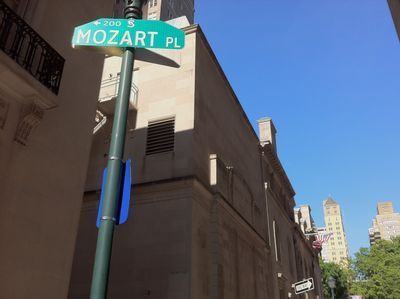Alex Ross's Blog, page 191
May 18, 2012
Beckett listens to Fischer-Dieskau
"A. [Avigdor Arikha] put on Hans Hotter singing Der Leiermann, S. preferred Fischer-Dieskau, 'at the end there's a real cry, he cries out.' We put on Fischer-Dieskau to compare. At the end, the cry, a shudder. S. looked at me, there it was. Nodded. Too moved to talk."
— Anne Atik, How It Was: A Memoir of Samuel Beckett
For Dietrich Fischer-Dieskau
A monumental, vastly influential figure is gone. I can't help feeling shock at the news — a world without Fischer-Dieskau seems foreign and unnerving. As it happens, I had been listening to his recordings constantly in recent days, as I worked on a column about Christian Gerhaher and Florian Boesch, two of his most distinguished younger successors. I will say more in The New Yorker a week from Monday.
May 16, 2012
City Opera's Telemann
I caught the New York City Opera presentation of Telemann's Orpheus at El Museo del Barrio last night, and find myself in accord with the Zerbinetta take. I'm happy to have seen the work, and Rebecca Taichman's staging has some vibrant touches (the scene centered on Nicholas Pallesen's commanding Pluto is a delight), but the score is quite far from being a neglected masterpiece, and, as Zerbinetta says, many Baroque operas — including at least four or five by Cavalli — deserved a New York staging in front of this one. Certainly, City Opera should receive credit for making resourceful use of the Museo del Barrio theater, a fine venue for Baroque opera. Two performances remain.
New horizons in concert publicity
Another striking announcement from the Spektral Quartet.
Previously: New horizons in classical poster design.
May 15, 2012
Justice Ginsburg's favorite records
The list that I hinted at the other day has now been published on the New Yorker website.
May 13, 2012
Go west, pure fool
On April 7, 1905, the Metropolitan Opera company brought Parsifal to the Grand Opera House on Mission Street, in San Francisco. The San Francisco Call devoted almost its entire front page to the spectacle. Sally Sharp has the society report: "Mrs. Edgar Peixotto, smart white silk gown with square decolletage. In her hair she wore a silver glitter crown, matching the trimming of the gown. Mrs. C. R. Krauthoff was most becomingly gowned in a heavy cream cloth gown on which was let in open work embroidery. Her opera coat was of white cloth with Irish point. Mrs. William Maxwell wore a pink crepe de chine, ruffled and accordion-pleated..." James Crawford monitors the aficionados: "After the second act a longhaired man sipped beer in the barroom and deplored as sacrilege the repeating recalling of Nordica and Burgstaller, because of the shattering effect on the 'reverential atmosphere.'" And Blanche Partington, a notable local figure who had recently been intimate with Jack London and would be the last to hear from Ambrose Bierce, covers the musical angle: "The provincial imagination refuses the task of picturing a performance of Parsifal more loftily-compelling in its spell, more exalted in its splendor, more human in its appeal, than the one given on Mission street yesterday by Herr Conried's people." The only non-operatic news on page 1 is a brief item about Geronimo, who, in old age, was pleading for his freedom. One year later, the Grand Opera House would be no more.
Preview of coming attractions
May 12, 2012
Ongoing construction
The building in the center of the picture has become the tallest structure in Manhattan. Any day now, I hear, the Bösendorfers will be hoisted up to the music critics' penthouse.
The next Curtis wave
I had the honor of speaking today at the commencement exercises for the Curtis Institute of Music. The graduating class was small — Curtis has a famously low acceptance rate of four percent — but I saw one familiar face in the varied throng: the gifted violinist Benjamin Beilman, whom I heard at Marlboro in 2008. Congratulations to him and to all the others. (One graduate, Nikki Chooi, was unable to attend because he is competing in the Queen Elisabeth Competition, and just made the finals.) Otto-Werner Mueller, a formidable guru of the art of conducting, was the focus of many tributes at the ceremony. The Curtis Symphony is flying tonight to Germany, with several appearances scheduled at the Dresdner Musikfestspiele next week. Last winter, Peter Dobrin, of the Philadelphia Inquirer, wrote a three-part series about the storied past and present-day evolution of this venerable institution, with various online features attached.
May 11, 2012
The Universe comes together
The 2012 edition of Spring for Music is drawing to a close, with two performances remaining: the Milwaukee Symphony tonight, the Nashville Symphony tomorrow. I've been to three of four concerts so far: Edmonton, New Jersey, Alabama. Marc-André Hamelin's rendition of the Busoni Piano Concerto was, as expected, a sensation. And, having heard the Alabama perform the Eroica in 2007, I was not surprised by the quality of their Beethoven Seventh, although perhaps others were. This was Justin Brown's Carnegie Hall debut, and it was long overdue. WQXR is again broadcasting and archiving the performances. Michael Huebner, of the Birmingham News, has covered all of the events so far, including, of course, the Alabama concert. Elizabeth Withey has the Edmonton perspective.
Above is the seating chart for the Nashville's rendition of the Ives Universe Symphony, as realized by Larry Austin. (You can click to make it larger.) The orchestra has been offering extensive coverage of its preparations on its Road to Carnegie website, not to mention Twitter and other media. Whoever has been running this online operation deserves a raise — it's an informative delight. One tweet shows the great three-hundred-pound bell that will sound every eight seconds during the wondrous opening section of the Universe, when twenty rhythmic layers accumulate, the bar variously divided into 2, 3, 4, 5, 6, 7, 8, 9, 10, 11, 12, 13, 14, 17, 19, 22, 23, 29, and 31 pulses. Back in 1996 I covered a performance of the Johnny Reinhard version of the Universe; that occasion also brought forth a remarkable piece by Richard Taruskin.
Alex Ross's Blog
- Alex Ross's profile
- 425 followers








